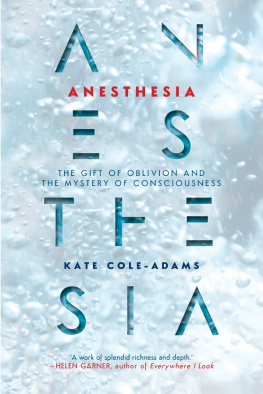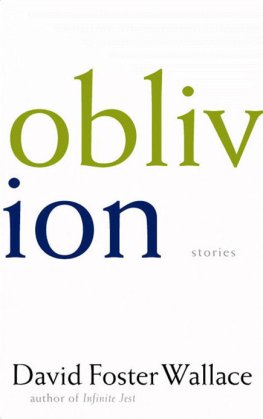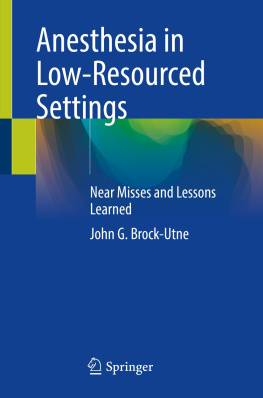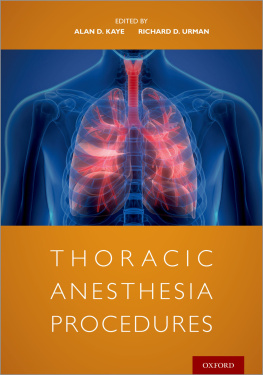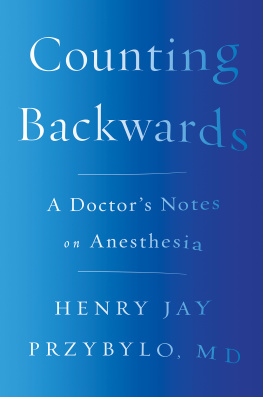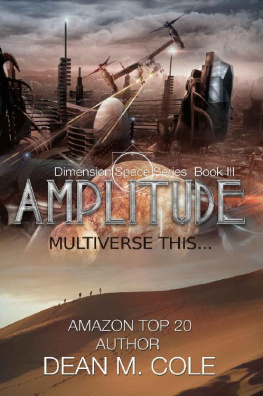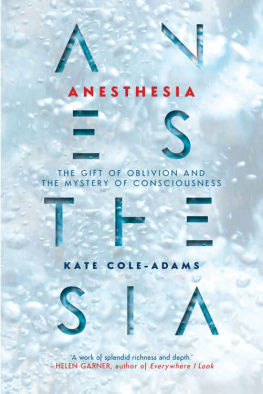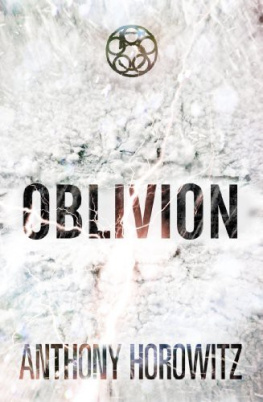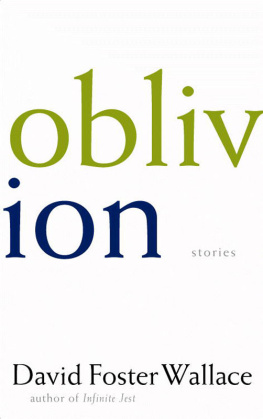Cole-Adams - Anesthesia: the gift of oblivion and the mystery of consciousness
Here you can read online Cole-Adams - Anesthesia: the gift of oblivion and the mystery of consciousness full text of the book (entire story) in english for free. Download pdf and epub, get meaning, cover and reviews about this ebook. City: Berkeley;CA, year: 2017, publisher: Counterpoint Press, genre: Art. Description of the work, (preface) as well as reviews are available. Best literature library LitArk.com created for fans of good reading and offers a wide selection of genres:
Romance novel
Science fiction
Adventure
Detective
Science
History
Home and family
Prose
Art
Politics
Computer
Non-fiction
Religion
Business
Children
Humor
Choose a favorite category and find really read worthwhile books. Enjoy immersion in the world of imagination, feel the emotions of the characters or learn something new for yourself, make an fascinating discovery.
Anesthesia: the gift of oblivion and the mystery of consciousness: summary, description and annotation
We offer to read an annotation, description, summary or preface (depends on what the author of the book "Anesthesia: the gift of oblivion and the mystery of consciousness" wrote himself). If you haven't found the necessary information about the book — write in the comments, we will try to find it.
Cole-Adams: author's other books
Who wrote Anesthesia: the gift of oblivion and the mystery of consciousness? Find out the surname, the name of the author of the book and a list of all author's works by series.
Anesthesia: the gift of oblivion and the mystery of consciousness — read online for free the complete book (whole text) full work
Below is the text of the book, divided by pages. System saving the place of the last page read, allows you to conveniently read the book "Anesthesia: the gift of oblivion and the mystery of consciousness" online for free, without having to search again every time where you left off. Put a bookmark, and you can go to the page where you finished reading at any time.
Font size:
Interval:
Bookmark:


Copyright 2017 by Kate Cole-Adams
First published in English as Anaesthesia by The Text Publishing Company, 2017
All rights reserved under International and Pan-American Copyright Conventions. No part of this book may be used or reproduced in any manner whatsoever without written permission from the publisher, except in the case of brief quotations embodied in critical articles and reviews.
Library of Congress Cataloging-in-Publication Data
Names: Cole-Adams, Kate, author.
Title: Anesthesia : the gift of oblivion and the mystery of consciousness /
Kate Cole-Adams.
Description: Berkeley, CA : Counterpoint Press, [2017] | Includes
bibliographical references and index.
Identifiers: LCCN 2017034798 | ISBN 9781619029507
Subjects: | MESH: Anesthesia | Anesthesiahistory | Consciousnessdrug
effects | Unconsciousnesschemically induced
Classification: LCC RD81 | NLM WO 200 | DDC 617.9/6dc23
LC record available at https://lccn.loc.gov/2017034798
Jacket designed by Sandy Cull, gogoGingko
COUNTERPOINT
2560 Ninth Street, Suite 318
Berkeley, CA 94710
www.counterpointpress.com
Printed in the United States of America
Distributed by Publishers Group West
10 9 8 7 6 5 4 3 2 1
For Pete, Finn and Frannie
With love and gratitude
Contents
Into the blue
I am in a smallish, whitish room in a hospital in Brisbane. It is night. On the wall opposite my bed I can dimly make out a crucifix with its limp passenger. Beneath it float wide blank windows through which I watch the synapses of city light: a web of tiny illuminations and extinctions that seem, when I loosen my gaze, almost to form patterns; as if they are about to make sense. I am surprised at how calm I feel.
In the weeks leading up to this moment I have set my affairs in order. Made a will, written letters for the children, waxed my legs. Said my farewells at the airport and boarded the flight from Melbourne with my mother. July 2010.
Some months before this, after decades of resistance, I gave in at last to the inevitability of major surgery. My capitulation was sudden and took place in a different wing of this same hospital, where I had come to consult a respected spinal surgeon. The surgeon had a quiet, almost diffident, manner and a moustache that put me in mind of a doleful Groucho. I am not sure what made my mind up, the moustache or the way his finger traced my wayward spine quite gently on the X-ray before him. But just as he began to tell me that I would not be a candidate for the type of noninvasive surgery we had been talking about, I realized with a small thud of certainty that, not only was I going to have this surgeryinvasive though it might beI was going to come back to Brisbane and he was going to do it.
In the aftermath of my decision, I was buoyed in a backwash of something like relief; a giving up of hope and its attendant efforts, a yielding to forces beyond my will. But when I lay awake at night, disquiet rose around me. It was not just the surgery that was worrying methe cutting and drilling, the inevitable riskit was that in some blank corner of myself I felt that I would not wake up afterward. I knew logically, and during the day could convince myself, that for an otherwise healthy forty-eight-year-old, the likelihood of calamity was low. But at night, there in my bed in Melbourne, the conviction multiplied inside me that even if everything went according to plan, the me who woke after surgery would not be the same in some essential way as the me who had been wheeled into the operating theater beforehand. I developed a dread of the moment when the anesthetic drugs would take effect and I would cease to be. I pictured myself in a stark, poorly lit room with two doors, one in, one out, neither of which I could open from within. Otherwise the room was empty. No windows, no furniture. In this darknesswhich I now realize had the same sinuous quality as the shadows beneath my childhood bedI would be trapped alone. Perhaps forever. At least until such time as someone else chose to release, not me but some other, ostensibly similar, version of me who would slip soundlessly into the life that had once been mine.
Shortly after making my decision I rang a separate Brisbane medical practice. I asked to speak to the doctor whose job it would be to render me unconscious and keep me that way during the long operation. Halting, almost apologetic, I explained to the receptionist that I had spent some years researching the process known as anesthesia, and that I was now rather nervous about what was going to happen to me. I think I know too much, I said.
Oh dear, said the receptionist. Thats not good.
This book explores perhaps the most brilliant and baffling gift of modern medicine: the disappearing act that enables doctors and dentists to carry out surgery and other procedures that would otherwise be impossibly, often fatally, painful.
Anesthesia . The term was appropriated from the Greek by New England physician and poet Oliver Wendell Holmes in 1846 to describe the effect of the drug ether following its first successful public demonstration in surgery. Anesthetize : to render insensible.
These days there are other sorts of anesthetics that can numb a tooth or a torso simply (or unsimply) by switching off the nerves in the relevant part of the body. But the most widespread and intriguing application of this curious craft is what is now known as general anesthesia. In general anesthesia it is not the nerve endings that are switched off, it is your brainor at least parts of it. These, it seems, include the connections that somehow enable the operation of our sense of self, or (loosely) consciousness, as well as the parts of the brain responsible for processing messages from the nerves telling us that we are in pain: the neurological equivalent of shooting the messenger. Which is, of course, a good thing.
More than a good thing. I would not have boarded that plane to Brisbane had it been otherwise. And I dont assume my fears were greater than those of anyone else in my predicament. But it was also true that for the previous decade I had been deeply preoccupied with a question or series of questions, often nebulous and contradictory, that amounted to this: what really happens to us when we are anesthetized?
By this I mean not what happens to the pinging, crackling apparatus of our nerves and spinal cords and brains, but what happens to us to the person who is me or the person who is youas doctors go about the messy business of slicing and delving within us? And, fused somehow to this, another odd and stubborn question: can whatever happens (or doesnt happen) while we are under anesthesia continue to affect us in our waking lives? Can it change the way we feel or think or behave in the minutes, months and even years after surgery? Finally I wondereda niggling, almost soundless irritation largely obscured by the first two questionswhy did I care?
Not so long ago, if you were unlucky enough to need surgery and strong enough to withstand it, you would be tied down and cut open, usually conscious and probably screaming. Poppy. Hemlock. Hemp. Over the centuries healers tried every imaginable way of preventing or deadening pain: pressing on arteries, pinching nerves, soaking sponges in narcotic herbs for patients to breathe through. Some practitioners favored a blow to the jaw; others rubbed stinging nettles on one part of the body to distract from another. Alcohol. Opium. Hypnosis. Prayer. Until the mid-1800s, surgery was almost always an agonizing last resort. Most of todays routine operations were impossible, and even when they werent, many patients chose death in preference. Suffering so great as I underwent cannot be expressed in words, wrote one survivor. The particular pangs are now forgotten; but the blank whirlwind of emotion, the horror of great darkness and the sense of desertion by God and man... I can never forget.
Next pageFont size:
Interval:
Bookmark:
Similar books «Anesthesia: the gift of oblivion and the mystery of consciousness»
Look at similar books to Anesthesia: the gift of oblivion and the mystery of consciousness. We have selected literature similar in name and meaning in the hope of providing readers with more options to find new, interesting, not yet read works.
Discussion, reviews of the book Anesthesia: the gift of oblivion and the mystery of consciousness and just readers' own opinions. Leave your comments, write what you think about the work, its meaning or the main characters. Specify what exactly you liked and what you didn't like, and why you think so.

